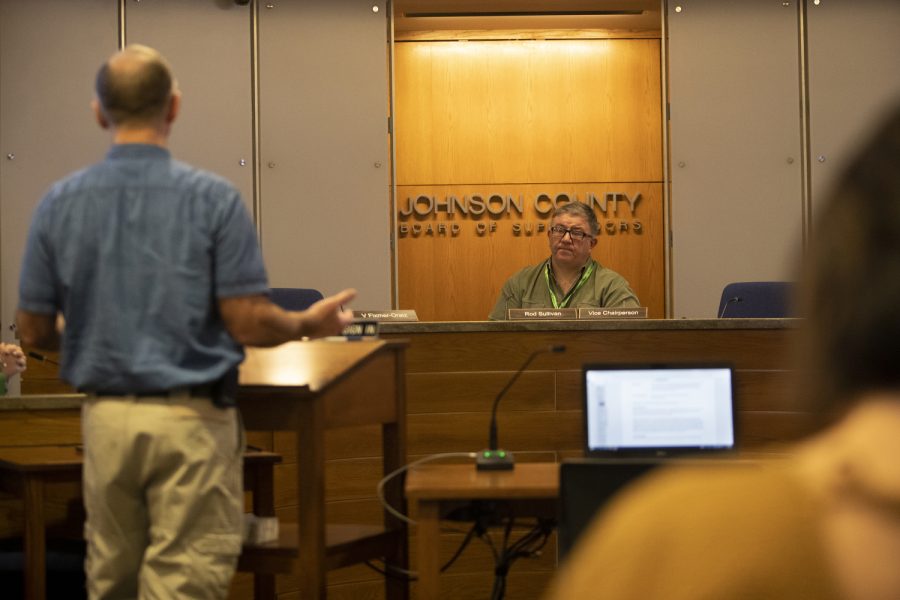Johnson County set to launch new mental health court
The new court will address the needs of mentally ill people, providing oversight and assistance so they can avoid punishment like jail.
Supervisor Rod Sullivan listens to speakers at a Johnson County Board of Supervisors work session Wednesday, Jan. 17, 2023.
March 27, 2023
A new mental health court is being established in Johnson County later this year with the aim of addressing individuals’ mental health needs that could lead to criminal behaviors.
The new court will be classified as a specialty court, which are problem-solving hearings that attempt to reduce criminal convictions.
A common type of specialty court in Iowa is drug courts. Linn County has a drug court, which provides supervision on potential offenders who would be sent to prison if the court didn’t exist. Johnson County had a drug court, although the program ended in July 2018.
Johnson County Assistant Attorney Lynn Rose said the initial idea for the court came from a specific community member.
“There is a mental health activist in our community named Leslie Carpenter and she had learned about this model being used in other states, and she convened a group,” Rose said. “And that, I believe, was in May or June of 2019, and so that was where the working group started.”
Rose said the mental health court focuses on individuals who struggle to manage a chronic mental health condition.
The new program comes a few weeks after the county announced plans to create a new violence reduction program. Johnson County Supervisor Jon Green said he supported the efforts and programs being created to provide alternatives to jail time.
“This is an effort at doing better for people who are having mental health crises. They haven’t done anything wrong. They’ve got a health problem, just like a sprained ankle or something. And ensuring that they get equitable access to treatment is important,” Green said.
The new court will operate on a civil court model, which Rose said will involve participants who have been hospitalized under Chapter 229 of Iowa Code. Many of these participants will be individuals with symptoms severe enough that they are potentially a danger to themselves or others.
Under the current system, Rose said, these people could be taken to a hospital and evaluated, only to then be released and told to come back for an appointment. Once released, they may be struggling to stay on their medication.
Whatever an individual’s mental health needs may be, the court will look to help patients stay on track and will also keep the providers accountable to make sure they’re helping the patients too.
Assisting in the court’s creation are several community partners, including the University of Iowa Hospitals and Clinics, law enforcement agencies, and AbbeHealth Services, among others.
RELATED: County exploring program to reduce gun violence with ARPA funds
Carrie Crain, AbbeHealth director of the assisted outpatient treatment program in Johnson County, said the court will give oversight to individuals and will additionally assist in areas such as housing, setting up transportation, and working with insurance, among others.
The court will be made up of a judicial referee, a coordinator, and a peer counselor, with the judicial referee acting as the judge for the mental health court.
These individuals will be responsible for working with patients, including doing regular check-ins, and also working with providers. Because the court is civil and not criminal, it will not have many powers. Rose said the court’s tools are essentially talking with people, and building relationships, although that’s meant to be the model of the court.
To find potential patients, Crain said she will be working with the different partners to get referrals based on who those partners think would be best suited for the program.
Rose said a referral criterion was created to assist in the process, and that the program will start by focusing on diagnoses such as schizophrenia, bipolar disorder, and severe depression and anxiety.
If the program is successful, it will expand who it will serve. For now, it will focus on those diagnoses. The program will also start small, initially taking in only a few patients, although Rose said she hopes to have 12 to 15 patients by the end of the year.
The program is in the final stages before it will begin as a pilot program. Rose said interviews were completed for a judicial referee, one of the new positions the program will create, and that other hirings were being finalized as well.
Pending discussions with Crain to select candidates for the new program, Rose estimated the program to start in May.
Looking ahead to when the program launches, Crain said she was hopeful that the program would help those in need by filling the gaps in the system.
“I think it will be a benefit to the Johnson County community, as well as each individual participant that we are able to work with, and I’m very excited to see this program grow not just in Johnson County, but across the state of Iowa if given the opportunity,” Crain said.



